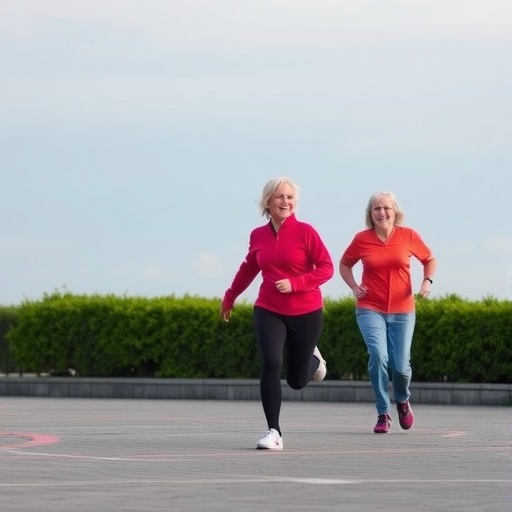A groundbreaking study led by researchers at the University of Surrey has shed new light on the complex interplay between psychological outlook and physical health among older adults, particularly those managing chronic health conditions. The compelling findings suggest that older individuals who embrace positive perceptions of ageing exhibit a significantly higher tendency to engage in vigorous physical activities. This research challenges prevailing notions that physical decline in later years is inevitable and highlights the potent role of mindset in promoting healthful behaviors.
The Surrey-led investigation meticulously analyzed data sourced from a substantial cohort of 1,699 residents across the United Kingdom, all aged 50 years and above. This extensive dataset allowed the researchers to explore correlations between ageing attitudes and physical activity levels, delving beyond surface observations to unearth nuanced patterns. Crucially, the study explored the attitudes individuals held about ageing itself—whether they viewed this life stage as one of potential growth and opportunity or as a period marked by inevitable decline and loss.
What sets this study apart is its focus on the large segment of older adults living with non-communicable diseases—including diabetes and cardiovascular conditions—which often pose significant barriers to physical exertion. The researchers found that even within this group, those who maintained a more optimistic perspective toward ageing were notably more likely to engage in vigorous physical activities, which can include brisk walking, running, swimming, or other forms of exercise demanding significant effort. This trend underscores the powerful buffering effect of a positive mental framework against the constraints imposed by chronic health issues.
Professor Victoria Tischler, a co-author of the study and esteemed Professor of Behavioural Science at the University of Surrey, expounded on the psychological implications of these findings. She emphasized that a constructive outlook on ageing may function as a critical psychological safeguard, empowering individuals to remain physically active despite facing health adversities. Such insights have far-reaching implications for public health strategies, indicating that targeting age-related beliefs may be just as crucial as addressing physical ailments directly.
Drawing on these insights, the study advocates for public health campaigns and interventions that specifically cultivate and sustain positive attitudes toward ageing and physical activity. Instead of focusing solely on the physical limitations associated with illness, such campaigns would aim to reshape collective and individual narratives surrounding ageing, encouraging older adults to perceive their later years as a dynamic stage in life replete with opportunities for engagement and vitality.
Dr. Serena Sabatini, the lead author and a visiting lecturer at the University of Surrey, highlighted the ambitious societal vision underpinning the research. She envisions a future where active and engaged lifestyles are not exceptions but normative experiences for older adults, irrespective of prevailing health conditions. Such a paradigm shift would redefine expectations around ageing, aligning societal attitudes with the well-documented benefits of sustained physical activity for cognitive, emotional, and physical well-being.
The physiological benefits of vigorous physical activity in older populations are well-established, encompassing improved cardiovascular health, enhanced muscular strength, greater mobility, and reduced risk of cognitive decline. The study’s revelation that psychological outlook significantly influences participation in such activities suggests an invaluable entry point for enhancing health outcomes on a population scale. Health professionals could integrate mindset-oriented interventions into routine care, thereby addressing the mental and emotional dimensions that underpin lifestyle choices.
Moreover, the research resonated particularly in light of the demographic trend toward ageing populations worldwide. As the proportion of older adults increases globally, understanding the modifiable factors that contribute to healthy ageing is imperative for sustainable healthcare systems and societal well-being. This study contributes a critical psychological perspective to this multidisciplinary challenge, identifying belief systems as potential targets for intervention programs aiming to extend healthspan alongside lifespan.
The University of Surrey team’s approach also encourages a reconceptualization of ageing, not as an inevitable march toward frailty but as a stage amenable to growth, adaptation, and resilience. This conception aligns with emerging models in gerontology that emphasize plasticity and the capacity for continual development in later life. Cultivating positive attitudes toward ageing could thus reinforce self-efficacy and motivation, catalyzing behaviors that sustain physical function and enrich quality of life.
Importantly, the study calls upon healthcare policymakers, practitioners, and community organizations to weave these psychological insights into the fabric of healthcare delivery. Interventions tailored to bolster positive views on ageing may take diverse forms, ranging from educational campaigns to community-based programs that provide social support and skill-building opportunities. By fostering environments that valorize ageing as a period of potential, society can dismantle ageist stereotypes that often discourage older adults from pursuing vigorous activities.
Furthermore, this research offers poignant implications for personalized medicine approaches. By recognizing the heterogeneity in psychological outlook among older adults, healthcare providers can better tailor advice and interventions to individual motivational profiles. Those who harbor more negative views about ageing may require additional psychological support and encouragement to overcome barriers to physical activity, while those with positive attitudes might be mobilized as peer mentors to promote active lifestyles within their communities.
In summation, the University of Surrey study represents a paradigm-shifting contribution to our understanding of ageing and health behavior. The robust linkage between a positive psychological outlook on ageing and increased engagement in vigorous physical activity, even in the presence of chronic diseases, offers an actionable pathway toward enhancing both the longevity and quality of life for older adults. This compelling evidence urges a holistic approach to healthy ageing—one that marries the physical with the psychological and reframes the narrative of growing older into one of empowerment and sustained vitality.
Subject of Research:
The psychological correlates of physical activity participation among older adults, focusing on the role of positive ageing attitudes in individuals with non-communicable diseases.
Article Title:
Not explicitly provided.
News Publication Date:
Not explicitly provided.
Web References:
https://www.mdpi.com/2227-9032/13/16/2071
http://dx.doi.org/10.3390/healthcare13162071
References:
University of Surrey study published in Healthcare (DOI: 10.3390/healthcare13162071).
Keywords:
Aging populations, Psychological science, Positive ageing attitudes, Physical activity, Non-communicable diseases, Healthy ageing, Behavioural science.




